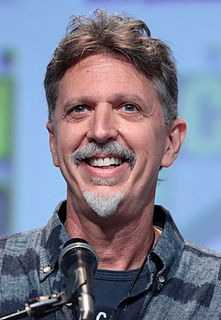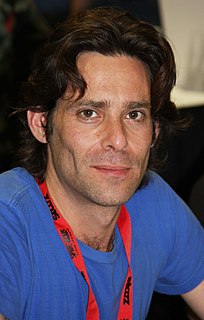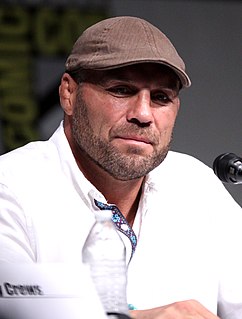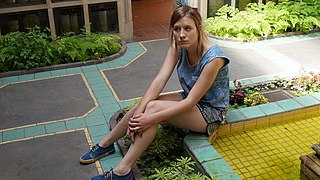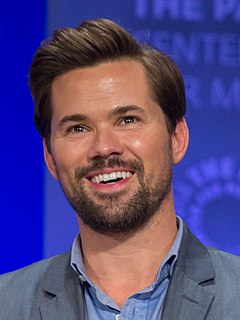A Quote by Tim Kring
Tou don't have to spoon feed things to the audience. They have to work at things. Oftentimes, with binge-able stuff, second and third viewings are really important because you see, "Oh, that character I didn't like, that was supposed to be that way because, in Episode 9, he turned out to be a turncoat. Now, I'm going to go back and watch all those moments that I felt that way about him." That's what's fun about it.
Related Quotes
When I watch the show [Westworld], it leaves me looking at the world around me in a new way. It really stays with you. And it's one of those things that you have to figure out. You're going to get little clues along the way, and every time you think you know what's up, we're going to flip it around. It's going to take you for a really awesome, crazy ride, but it's a really, really revolutionary character for women. There's a lot of really fun stuff to look forward to.
The things that I have said when I was young and curious about whatever the subject matter was, I respect those - those are growing pains. Even if you make mistakes, I go back to those things, my not-so-great moments because those are my truest moments; those are my human moments. I'm not even mad at the things I said that were a little dicey.
It's interesting to play that [ Thomas in The Maze Runner], actually. The audience gets to see the character discover who he is, things that he never even knew about himself. I love that Thomas starts out as the newbie, as the 'Greenie', and the audience kind of experiences that through his perspective. It's really cool to watch him discover these leadership qualities that he has, and the way you approach it... I guess, just honestly. As honest as you can, really.
Rather than, as an actor, I want the audience to like me, I'm going to smile beautifully and I've got everybody's sympathy - what about showing the moments when somebody is unbelievably petty? Or really selfish? The faults, the little things, those are the things that interested me about playing the character.
I wanted to be a singer, of course, but there was something about the songwriting, then and now, that is the most important thing. It's how I express myself, how I express how I see things. When I see people struggling with emotions and feelings and don't know how to put it down, I'm able to do that. It's really like a therapy, and it's like a buddy and a friend. It's a way out of a lot of things.
People have so many expectations when they go out on stage, so many wishes about what their night is going to be: if they're going to meet that person, have a fun time with their friends, have a good high, hear good music. People get drunk and turn into themselves in a way, and they go to experience some kind of emotion. But it's not always about fun. There's a destructive side to it. But I'm more into the empowerment of going out, because it's always been the place where I could be myself and get inspired. Even if I'm sad, dancing is a way to let stuff out.
There was things just like not being able to date or - I'm talking like 15, 16 - like just certain things that my friends started to do. Like, they started to get phone calls from girls or like, you know, go and hang out 10, 11 at night, kind of going to the movies. There were just certain things that - it's not that I couldn't do all of those things. It's just that every choice was really deliberate and conscious and thought out and sort of balanced against the religion in a way where I felt - I wasn't necessarily trying to convert at 12 like [my mother] was.
Parker wasn't supposed to be a series. He was supposed to be one book, and if he was only going to be in one book, I didn't worry about it. And then an editor at Pocket Books said "Write more books about him." So I didn't go back at that point and give him a first name. If I'd known he would've been a series, I would've done two things differently. First, I would've given him a first name because that means for 27 books, I've had to find some other way to say, "Parker parked the car."
The way that we're consuming what we watch. Netflix, binge-watching, destination agnostic were not terms. It was about networks, times, dates. Even with feature films, you had to see it this way, in this capacity, at this time. All that has changed. Now it's really about the story. It's a gift that I became a storyteller at this time.
I feel like I turned down a lot of things that I wish I hadn't. But you never know when you're younger. I don't have regrets about certain things I turned down. Those films would have required things of me that would have been challenging, and they ended up being really good movies. But I was never a careerist, I never thought in those terms. I'd be like, "Oh, I'm tired. I don't want to work."
The thing about writing or making art is that I'm not thinking about that stuff while I'm doing it. Like the driver's ed kid, in retrospect I see that that was meaningful, and I felt close to him in that way, but at the time I just thought it was fun to draw, and that's all it was. I think that's what's weird about life and about making art. You have to talk about it later. I guess I should be prepared to talk about it now. That is why I'm here. But again, pass.
Luckily Ryan Murphy has a great track record of really having his finger on the pulse of pop culture in a way that very few people do. And he is able to work things into stories in a ridiculously timely way - sometimes, before anybody else thinks it's going to be a thing, he is able to create these moments on television. I was thrilled to get to work with him, and I knew he would be able to tell that story with that same energy.
